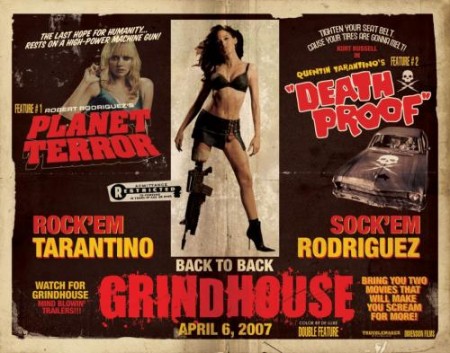#December2017
Tarantino and Abrams are working on a ‘Star Trek’ movie that Tarantino may direct. Wait, what the fuck?
This…this news is interesting. To say the least. Like, what the fuck is even going on? The last year has proven obvious that the walls of reality are decaying around us, and it’s usually been terrible. But, this is pretty fucking neat.
Monday Morning Commute: Santa’s atomic leg-drop.
It’s Christmas Eve, and you’d damn well better hope that you’ve been good this year.
Why is that? Well, I just got off the phone with Santa Claus. He’s doing well. He’s busy, of course, but things are goin’ his way. His stocks’re on the rise. He left that frumpy wife of his and snagged a lover more to his liking. And he’s decided to finally stop being so damn soft on those perennial residents of the Naughty List. Given what St. Nick has in store for this year’s crop of bad boys and girls, coal in the stocking is going to look like a walk in the park.
If you haven’t been good for goodness’ sake, Santa Claus is going to rock you with an atomic leg-drop.
There’s no way to know ahead of time whether you’ll be gettin’ a Furby or a beatdown from Santa. You’ll just have to wait until tomorrow morning — either you’ll wake up to open presents in your pajamas, or you’ll wake up with missing teeth and cracked ribs. But why don’t we share some ways to pass the time until then? Hell, this is the Monday Morning Commute, the very spot where we meet to discuss the various ways we’ll be entertaining ourselves.
After all, it’s easy to get bested by the ennui-daemons and work-overlords. If we don’t take the time to enjoy ourselves, we’ll die as nothing more than the miserable, boring wretches that the Man wants us to be. So let’s rebel! Our bosses don’t own our souls, and Santa may break our backs, but he can’t break our spirits!
C’mon, let’s do this!
[Interview] (Also Known As) Steven Walters
A couple weeks ago I sat down with a comic called A.K.A., fully intending to just read the first issue in the collection. Before I knew it, an hour had passed and final panels of the book were quickly transforming from mysteries into memories. What was it that inspired me to keep readin’, ignorin’ the ringin’ phone and the frantic cries of the mailman outside my window to save him from the vocal veteran’s rabid mailman?
Pure comics bad-assery.
A.K.A. is a perfect throwback to those golden years when mawkish snooze fests hopin’ to snag Oscars weren’t the only films considered high-quality. No, this comic summons the spirits of the 1970s exploitation flicks that taught moviegoers the value of flawed heroes, babes with dangerous measurements, and gratuitous violence. As the (anti)hero of A.K.A., Guy Doyle navigates his way through these elements, in the process teaching the reader how to revel in the chaos of a mob war.
So won over was my heart that I decided to reach out to Steven Walters, the man responsible for penning this tasteful tale of tawdry turmoil. Walters proved to be incredibly gracious, answering each of my questions with vigor and poise. Which was reassuring, as many of his characters are less gracious and more bloodthirsty.
Hit the jump to check out what Walters’ thoughts on the comics medium, exploitation films, and the quest of artistic expression.
OCTOBERFEAST – Grindhouse
[OCTOBERFEAST is the greatest celebration of the year, a revelry dedicated to pop-culture’s most nutritious Halloween detritus. Plastic screams and artificial sweeteners have never been more bountiful. In the old country, villagers refer to the extended party as Satan’s Snacktime]
As you no doubt know, OCTOBERFEAST is the annual celebration of shock-and-awe entertainment, those dastardly bits and pieces that we can’t help but love with mouths agape and eyes closed. The same way that cavemen would streak past brontosaurus nests for cheap thrills, we need to scare ourselves silly sometimes. And to do this, we watch scene after scene of gruesome murders, horrifying mutations, and savage acts of violence.
Again, the reason we meet year-after-year to celebrate this tenth-month carnal carnival is the fact that there are deep-seated desires in all of us to explore the sweet ugliness. Unfortunately, there are those that think indecency has no place in entertainment. That depictions of decapitation are in poor taste. That zombie movies are not only insidious but also trite. Hell, this moral imposition isn’t a new idea, but the self-righteous are proliferating at unprecedented rates.
Fortunately, there are heroes amongst us.
In 2007, Robert Rodriguez and Quentin Tarantino teamed up for the exploitation-throwback Grindhouse. This double-feature consists of two original flicks shown back-to-back which are also accompanied by faux-trailers. If nothing else, the experiment was a deal for the fans just in terms of economics: one regularly-priced ticket granted a viewer access to far more material than that which is provided by any standard flick.
With that being said, Grindhouse is also a horrific tour-de-force, a masterpiece for those who love blood and guts and gore and camp.
The first entry in the two-movie feature is Rodriguez’s Planet Terror. This flick is an over-top-zombie flick that sees Rose McGowan stealing the show not only with her scantily clad body, but also her firearm leg prosthesis. There’re gross-out moments with zombies exploding, laughs-a-plenty with some characters being more concerned with BBQ recipes than the end times, and conveniently missing reels. To top it all off, the movie has Bruce Willis.
That’s right – McClane himself.
On the other hand, Tarantino’s Death Proof presents a brand of terror that is more grounded in its intentions. This second flick sees Kurt Russell playing Stuntman Mike, a washed up stunt driver longing for the glory days of Hollywood during which the stunt people reigned supreme. To get his kicks now that he’s been replaced by CGI, Stuntman Mike offers hot babes rides in his car. Of course, there’s a catch: Mike’s stunt car is completely death proof for the driver, but nearly guaranteed to kill a passenger if it crashes.
Which it does. Because that’s what Stuntman Mike wants, and he gets what he wants. That is, of course, until he runs into a pack of bad-ass bitches that don’t take shit from anyone, including maniacs with film-industry experience.
Grindhouse is a rare treat, as it knows exactly what it is and revels in it. Tarantino and Rodriguez manage to simultaneously poke fun at the conventions of classic grindhouse flicks while paying homage and revering them. Additionally, clocking in at just over three hours, this cinematic collection is the perfect accompaniment for a cold, dank OCTOBERFEAST eve.
Quentin Tarantino is a Subversive Basterd

Spoilers Ahead. Serious Spoilers.
Quentin Tarantino’s new film, Inglourious Basterds, is about a lot of different things. On the surface, Basterds is a simple World War II-era story in which a band of Jewish-American soldiers travel into Nazi-occupied France in order to kill (and scalp!) as many Nazis as possible. Of course, when Tarantino is at the helm of such a plot, it can only be accompanied with brains bashed in with a baseball bat, shootouts, explosions, witty banter, a Mexican standoff, sexy women, and all of the director’s other trademarks.
But much more importantly, Inglourious Basterds is a film about film. About the subversion of film, to be more precise.
With that being said, it is worthwhile to first delve into the notion that Inglourious Basterds is actually an exploration of film itself. Conspicuously, many of the characters have various positions within the film industry; Shoshanna owns a cinema in Paris, Marcel helps maintain and operate said cinema, Frederick Zoller is a Nazi war hero starring in a biographical movie, German Minister of Propaganda Joseph Goebbels is tasked with producing this movie, and German actress Bridget von Hammersmark is a double-agent working for the British. As these pivotal characters play a number of different (yet equally important) roles, Inglorious Basterds suggests that the consciousness of film is stocked with varying strains of the human condition.
More pragmatically, Inglourious Basterds’ advocacy on the behalf of film can be found in its plot. While the trailers and taglines are advertising the fact that the movie features a bunch of Jewish-Americans killing Nazis, they neglect to mention that the Basterds’ true aim is to assassinate several hundred top Nazi officials (including Hitler himself); conveniently (or is it thematically?), these officials are all going to be gathered together at Shoshanna’s cinema for the premiere of A Nation’s Pride, Goebbels’ newest piece of propaganda. Resultingly, the Basterds spend a good deal of their inglorious adventures trying to figure out how to get into the premiere so that their primary task can be completed. By centering his newest work on the idea that a movie theater can be the single most important place on Earth, Tarantino effectively demonstrates the power and magnitude of film.
Thirdly, Inglourious Basterds works as a sort of self-aware investigation of film through much of its overt exposition. The name-dropping of (ostensibly classic) foreign language films, actors/actresses, and directors becomes so ubiquitous that I began to sense myself tuning them out — every character seems to get a chance to talk about movies at one point or another. Even less subtle is the brief narrative pause in which a Samuel L. Jackson voice-over presents an anecdotal history of 35mm’s more explosive qualities. And although this segment is well-done and wholly entertaining, other (less obvious) narrative devices could have been employed in order to convey the same information. But by deftly incorporating references to the film industry and even the literal film itself, Inglourious Basterds manages to keep the forefront of the audience’s mind more consciously concerned with movies.
So yes, it is obvious to even the least astute viewers that film may be the very crux of Inglourious Basterds. More interestingly, though, is the idea that Tarantino is commenting on cinematic subversion, an act to which he is no stranger. The spirit of subversion, of challenging the power structure at large in the hopes of building anew, is embodied in the plans of Shoshanna & Marcel.
Shoshanna conceives of a strategy with which she can effectively destroy the oppressive regime under which she has lived & avenge the death of her family; she allows the Nazis to premiere their newest propaganda film at her cinema so that she can:
A) Splice in footage of her own anti-Nazi sentiments.
B) Lock the doors and burn down the entire theater, killing her enemies in the process.
Furthermore, Shoshanna convinces Marcel that her collection of (highly flammable) 35mm films will be more than suitable to fuel the fatal fire.
The plan goes off (albeit not without a hitch or two), and Inglourious Basterds ends by revealing itself to be a sort of alternate-universe version of World War II, in which the Americans win in 1944. Therefore, the viewer is left with the impression that the subversion of film (the claiming for one’s own that by which he/she has been oppressed) can lead to the defeat of the most tyrannical of forces.
To reiterate, Shoshanna and Marcel take the weapon of the ruling power (film) and use it for their own purpose, which just so happens to be counter to that of those wielding the weapon in the first place. Playing to a crowd of shocked/confused/disgusted Nazis, Shoshanna’s filmed message instructs Marcel to burn it down, prompting him to flick his cigarette into the 35mm collection. This act is especially incendiary because it is brought about by two minorities (a Jew in hiding and a black Frenchman during the occupation), and there is something resonant in the idea that scourge of an oppressive regime can bring about its demise. And although the literal result of burning the evil Nazi crime lords to death is an amazing scene, its figurative implications are far more fulfilling.
In a sense, what Tarantino seems to be advocating is not for blanket imitation or pastiche; instead, he believes that the forms of yesteryear can be manipulated in such a way as to become new entities altogether – thereby allowing for the possibility of resisting the structure as it originally stood. Tarantino has always taken bits of pieces from various sources (spaghetti westerns, art house, grindhouse, Blaxploitation, kung-fu, etc., etc.) and added them together with new elements as to create original pieces that incorporate some previously established elements that have stood the tests of time.
Maybe I’m going on a limb here, but I can’t help but feel as though Inglourious Basterds is more than just an old-fashioned Nazi-killing jamboree. It’s about the power of narrative, the persuasive force that is propaganda, and the hope & possibility granted to those who defy the standards by reworking the supposedly predetermined into something liberating and novel.
In any case, I’m really digging Inglourious Basterds — all I have done since watching it tonight was ponder these (Insightful? Ridiculous? Misguided?) ideas and attempt to sling them into my word processor. It’s almost 4 AM and all I want to do is see the movie again. Too bad I have to do some other stupid shit first, like edit these two pages and then go to sleep.
Bah!








